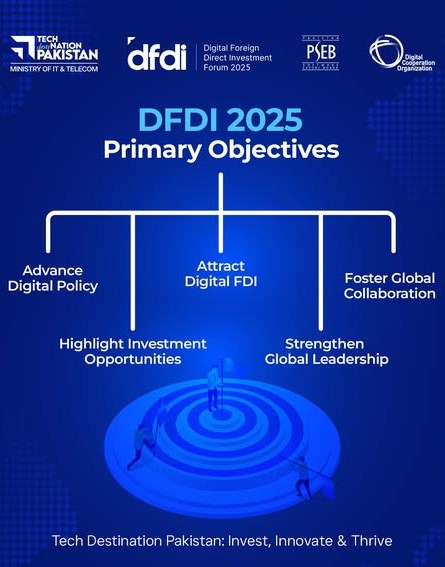Table of Contents
Digital Foreign Direct Investment (DFDI) is transforming the way countries attract and manage foreign investments in the digital age. By focusing on digital sectors such as e-commerce, fintech, and digital infrastructure, DFDI enables nations to integrate more deeply into the global economy. This article delves into the concept of DFDI, its significance, and how it’s shaping the future of international investments.
Understanding Digital Foreign Direct Investment
What is Digital Foreign Direct Investment?
Digital Foreign Direct Investment refers to cross-border investments in digital sectors, including technology, digital services, and infrastructure. Unlike traditional FDI, which often involves physical assets, DFDI focuses on intangible assets and digital capabilities.
Key Components of DFDI
- Digital Infrastructure: Investments in broadband networks, data centers, and cloud computing facilities.
- Digital Services: Investments in sectors like fintech, e-commerce, and online education.
- Digital Platforms: Investments in platforms that facilitate digital transactions and services.
The Significance of Digital Foreign Direct Investment
Economic Growth and Innovation
DFDI plays a crucial role in driving economic growth by fostering innovation and creating new job opportunities. By attracting foreign investments in digital sectors, countries can enhance their technological capabilities and competitiveness.
Enhancing Digital Infrastructure
Investments in digital infrastructure are essential for supporting the digital economy. DFDI enables countries to build robust digital networks, ensuring better connectivity and access to digital services.
Facilitating Global Integration
Through DFDI, countries can integrate more deeply into global value chains, expanding their reach in international markets and enhancing their economic resilience.

Case Study: Pakistan’s Pioneering Role in Digital Foreign Direct Investment
Digital Foreign Direct Investment in Pakistan has taken center stage as the country rapidly embraces the digital revolution. Recognizing the transformative power of digitalization, Pakistan has positioned itself as a forerunner in creating an investment-friendly environment tailored for digital investors. Spearheaded by government agencies and supported by international collaborations, the country is actively setting new benchmarks for Digital Foreign Direct Investment in South Asia.
The Digital FDI-Enabling Project
In partnership with the World Economic Forum (WEF) and the Digital Cooperation Organization (DCO), Pakistan launched the Digital FDI-Enabling Project, aimed at building a robust digital investment ecosystem. This initiative has focused on breaking down traditional investment barriers and replacing them with digital-first policies and practices.
Key objectives of the project include:
- Streamlining Investment Regulations: Simplifying licensing and digital business registration processes to reduce investor friction.
- Improving Data Governance: Creating frameworks for data protection, cross-border data flow, and digital privacy compliance.
- Building Digital Trust: Enhancing cybersecurity protocols to assure foreign investors that their operations and data are secure in Pakistan.
- Expanding Access to Financing: Facilitating access to venture capital, especially for tech startups and SMEs involved in cross-border operations.
This comprehensive project has placed Digital Foreign Direct Investment at the forefront of Pakistan’s national economic strategy.
Key Reforms and Policy Shifts
To support Digital Foreign Direct Investment, Pakistan has made major policy reforms:
- Special Technology Zones Authority (STZA): The government established STZA to create exclusive zones that offer tax incentives, legal protections, and high-tech infrastructure to foreign digital investors.
- Pakistan Startup Fund: Launched to offer equity-free grants to promising startups, particularly those attracting foreign capital or operating in export-focused digital services.
- Ease of Doing Business Enhancements: Streamlined processes for company registration, tax compliance, and visa issuance for foreign digital talent and investors.
These reforms aim to create an attractive environment for digital entrepreneurs and multinational technology companies.
Growing Digital Infrastructure to Support DFDI
Pakistan understands that Digital Foreign Direct Investment thrives on advanced infrastructure. In recent years, the government has:
- Expanded Fiber-Optic Networks: Over 25,000 kilometers of fiber has been laid across the country, improving internet penetration.
- Increased 4G and 5G Coverage: Telecom companies are investing in high-speed mobile broadband infrastructure to serve both urban and rural areas.
- Promoted Cloud Infrastructure: Policies supporting cloud storage services have paved the way for global tech companies to host services in-country.
The Digital Pakistan Policy 2021 set the groundwork for such initiatives, with a strong emphasis on connectivity and technological sovereignty.
Investment Success Stories
Several successful examples demonstrate the potential of Digital Foreign Direct Investment in Pakistan:
- Airlift Technologies: Initially launched as a mass transit startup, Airlift attracted over $85 million in Series B funding, one of the largest in Pakistan’s history, with participation from global investors.
- Bykea: A digital logistics and transport platform that raised millions in foreign capital, enabling it to scale operations and expand services.
- Careem (a subsidiary of Uber): Entered Pakistan through foreign direct investment, building local operations, hiring local talent, and establishing one of its strongest regional markets.
These stories highlight the capacity of Pakistan’s tech ecosystem to absorb, utilize, and multiply digital capital effectively.
Public-Private Collaborations Driving DFDI
Public-private partnerships are playing a vital role in enabling Digital Foreign Direct Investment in Pakistan:
- Ignite National Technology Fund: Supports innovation and research in areas like AI, IoT, and cybersecurity, often in collaboration with foreign companies.
- Tech Destination Pakistan Campaign: Launched to showcase Pakistan’s digital potential to global investors, featuring testimonials from successful investors and case studies from existing ventures.
- Collaboration with Microsoft and Huawei: These global giants have initiated training and infrastructure projects in partnership with Pakistan’s Ministry of IT and Telecom, demonstrating their long-term commitment.
Such partnerships validate the country’s readiness to support and expand its DFDI ambitions.
Challenges and Opportunities
Despite these advancements, Pakistan still faces several challenges in maximizing Digital Foreign Direct Investment:
Challenges:
- Policy Implementation Gaps: While policies are well-framed, inconsistent implementation across provinces sometimes deters investors.
- Limited Global Branding: Pakistan’s digital ecosystem needs stronger international branding to position itself as a reliable tech hub.
- Cybersecurity Readiness: Although improving, cybersecurity remains a concern, especially for high-risk digital sectors like fintech.
Opportunities:
- Youth Demographic Advantage: With over 60% of the population under 30, Pakistan has a digitally native workforce eager to participate in the digital economy.
- Regional Trade: Pakistan’s location offers access to Central Asia, the Middle East, and China, making it a gateway for regional DFDI.
- Expanding Diaspora Investments: Many Pakistani expatriates in tech fields are reinvesting in the country’s startup ecosystem, creating further avenues for foreign capital inflow.
Vision for the Future
The vision for Digital Foreign Direct Investment in Pakistan is bold and future-focused. The government aims to:
- Increase digital FDI by 300% over the next five years
- Establish 15+ Special Technology Zones nationwide
- Train 1 million digital professionals for global digital exports
- Position Pakistan among the top 10 global outsourcing destinations
This vision is not only ambitious but also achievable, given the current momentum and support from international development organizations.
Challenges in Implementing Digital Foreign Direct Investment
Regulatory Hurdles
Inconsistent regulations and lack of clear policies can deter foreign investors. Countries need to establish transparent and investor-friendly regulatory frameworks to attract DFDI.Dawn
Infrastructure Deficits
Limited digital infrastructure, such as inadequate broadband coverage and data centers, can hinder the growth of the digital economy. Investments in infrastructure are crucial for supporting DFDI.
Intellectual Property Concerns
Weak intellectual property rights protection can discourage foreign investments in digital sectors. Strengthening IP laws and enforcement mechanisms is essential for fostering investor confidence.
Strategies to Attract Digital Foreign Direct Investment
Policy Reforms
Implementing policies that promote digital investments, such as tax incentives and streamlined approval processes, can make countries more attractive to foreign investors.
Public-Private Partnerships
Collaborations between governments and private sector entities can drive the development of digital infrastructure and services, facilitating DFDI.
Capacity Building
Investing in digital literacy and skills development ensures a workforce capable of supporting the digital economy, making the country more appealing to investors.
Global Trends in Digital Foreign Direct Investment
Increasing Investments in Emerging Markets
Emerging economies are witnessing a surge in DFDI as they develop digital infrastructure and implement investor-friendly policies.
Focus on Sustainable Development
DFDI is increasingly aligned with sustainable development goals, promoting inclusive growth and environmental sustainability through digital solutions.
Technological Advancements
Advancements in technologies like artificial intelligence and blockchain are attracting foreign investments in digital sectors, driving innovation and economic growth.

Conclusion
Digital Foreign Direct Investment is a catalyst for economic transformation in the digital age. By embracing DFDI, countries can enhance their digital capabilities, attract foreign investments, and integrate more deeply into the global economy. Strategic policy reforms, infrastructure development, and capacity building are essential for maximizing the benefits of DFDI and ensuring sustainable economic growth.
